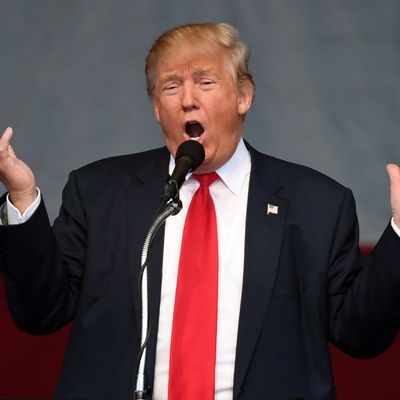
Donald Trump calls himself the “law-and-order candidate.” But this is a misnomer. The Republican nominee’s views on criminal justice are not animated by a desire to uphold the rule of law, but by an affinity for playing the merciless avenger. When maintaining law and order becomes an obstacle to revenge, Trump loses all interest in maintaining either.
One ostensible reason for the global community to seek the destruction of the Islamic State is that the group commits atrocities that contravene international law. But Donald Trump has no interest in defending international law. His interest is in projecting toughness. Thus, he has called for the U.S. military to deliberately murder terrorists’ children.
One ostensible goal of terror attacks is to disrupt the orderly functioning of the targeted society. But when the Chelsea bombing suspect was captured, Trump complained that this American citizen had been provided medical care and access to legal representation. The suffering of the guilty — as determined by Donald Trump — should take precedence over upholding the Constitution.
On Thursday, Trump reaffirmed his view that law and order must take a backseat to punishing people (particularly, nonwhite people) whom he has declared guilty. Asked by CNN for a comment on the exoneration of the Central Park Five, the Republican nominee provided this statement:
They admitted they were guilty. The police doing the original investigation say they were guilty. The fact that that case was settled with so much evidence against them is outrageous. And the woman, so badly injured, will never be the same.
To understand what makes this statement remarkable, let’s review the saga of the Central Park Five and Trump’s role therein.
In 1989, five teenagers — four black and one Hispanic — were arrested for the rape of a 28-year-old white woman in Central Park. The woman was left bound, beaten, and brain-damaged. She was identified as a banker, an ambitious career woman, the kind of person the city needed more of. The “Central Park Five” were identified as hoodlums, superpredators, the kind of people the city needed to expel.
The crime sold papers.
And Trump took out full-page ads in all of New York City’s major ones, two weeks after the attack, calling for the reinstatement of the death penalty. The mogul never explicitly mentioned the five, but did reference criminals who “beat and rape a helpless woman.”
After two days of questioning, police secured confessions from all five of the accused — although each teenager denied raping the woman himself, and placed guilt on someone else within the group. They later retracted those confessions, claiming they’d been coerced. They were convicted nonetheless.
But in 2002, a convicted rapist named Matias Reyes confessed to the crime, saying he had acted alone. While police were unable to connect DNA from any of the Central Park Five to the scene of the crime, Reyes’s DNA matched that in semen found on the victim’s body. The five were exonerated and paid a $41 million settlement in 2014.
In 2003, a panel commissioned by the NYPD did find that there had been no misconduct in the investigation of the case, and suggested that the five were still “likely guilty” of the crime. The panel’s central contentions were that the confessions had not been coerced, and that the only evidence suggesting that Reyes acted alone was his own word. Nonetheless, the panel concluded that the convictions had to be overturned because Reyes’s confession constituted “new evidence that had to be evaluated by a jury.’’
Trump endorses the NYPD’s conclusion on the five’s guilt — but not its recognition that DNA evidence and a voluntary confession contradicting the state’s initial theory of the case requires their convictions to be vacated.
For the Republican nominee, the word of police officers speaks louder than the DNA. The need to punish those he sees as guilty matters more than honoring the standard of reasonable doubt.
Notably, with certain suspects, Trump feels comfortable questioning the judgment of authorities.
Trump’s statement on the Central Park Five is disturbing not merely for the racial prejudice and contempt for the rights of defendants it evinces, but also for the way it reveals the candidate’s incapacity to admit even the possibility of error.
This November, America could elect a bigoted president who disdains the rule of law and believes his own judgment is infallible. What could go wrong?






























